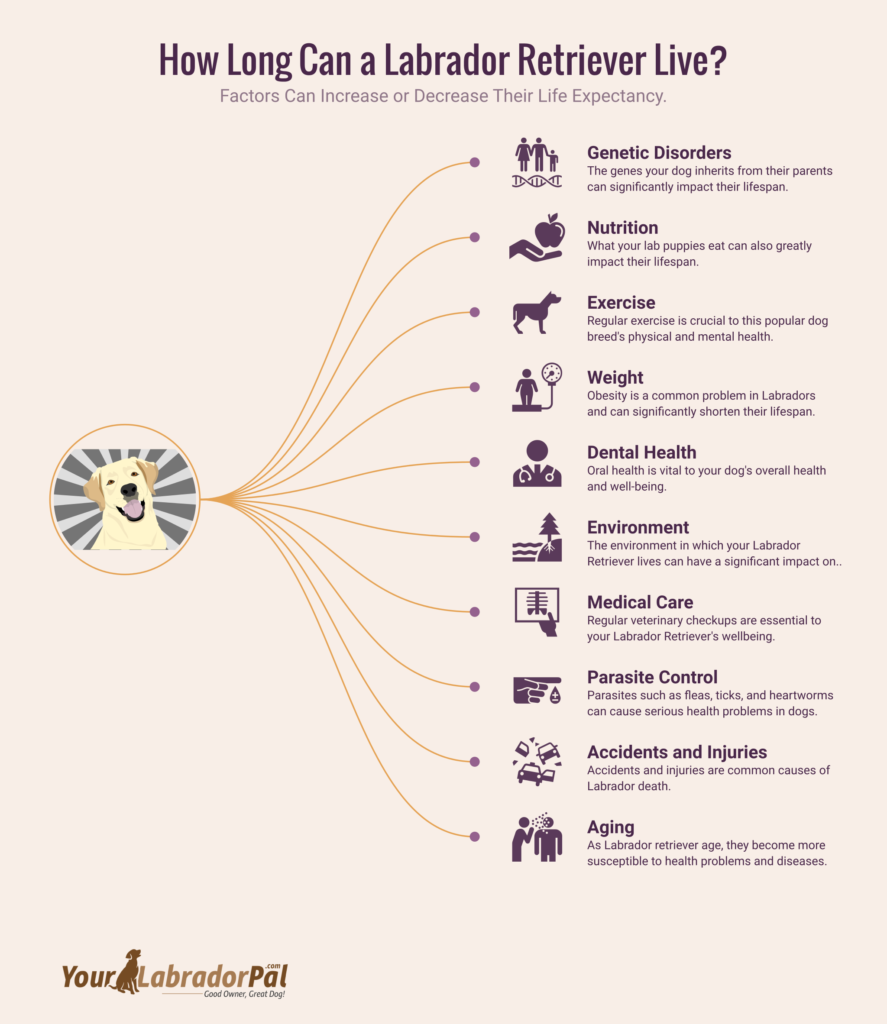How Long Can a Labrador Retriever Live?
Have you ever wondered how long can a Labrador retriever live? Well, prepare to be amazed! These furry friends are known for their energy and playful nature but also have a long lifespan. The oldest known Labrador retriever lived for 27 years, though the average lifespan for this breed is 12 years. Thus, Labrador retrievers are robust and hearty, but certain factors can affect their lifespan.
So whether you’re a proud owner of a Labrador or considering adding one to your family. It’s important to understand the factors that can affect how long can a Labrador retriever live. So, grab a treat and take a seat as we delve deeper into the Labrador lifespan of one of our favorite dog breeds – the lovable retriever.
Introducing the Labrador Retrievers
The Labrador Retriever originated in Newfoundland, Canada, where it was first bred to help fishermen retrieve fishing nets and fish. They were so good at their job that they quickly became popular as hunting dogs. Over time, they became great family dogs and are one of the most popular breeds registered by the American Kennel Club.
These lovable dogs have short coats and are known for their intelligence, loyalty, friendly personalities, and energy. They have a natural love for swimming and playing fetch. Labrador puppies are incredibly intelligent, making them very easy to train, including assisting people with disabilities, searching and rescue operations, and even acting roles in movies. However, it’s important to remember that behind the floppy ears and friendly face lies a working dog with an active lifestyle.
A Labrador Retriever would make an ideal running or hiking companion if you’re active. On the other hand, if you prefer a more laid-back lifestyle, they’re just as happy to sit beside you on the couch and watch movies.
How Long Can a Labrador Retriever Live?
As mentioned, the average labrador’s lifespan is 12 years. However, many factors can increase or decrease their life expectancy.
1: Genetic Disorders
The genes your dog inherits from their parents can significantly impact their lifespan. Some genetic diseases can shorten their lives, while others can make them more resilient to dog’s health problems. Therefore, it is important to get your Labrador Retriever from a reputable breeder who conducts health screenings on their breeding dogs.
2: Nutrition
What your lab puppies eat can also greatly impact their lifespan. A well-balanced and nutritious diet that meets all their nutritional needs can help your dog live longer and healthier. You should feed your Labrador Retriever high-quality dog food that contains all the essential nutrients, vitamins, and minerals they need.
3: Exercise
Regular exercise is crucial to this popular dog breed’s physical and mental health. Labradors are active and energetic dogs that require daily exercise to stay fit and healthy. Lack of exercise or too much sedentary time can lead to obesity, joint problems, and other health issues that can shorten their life.
4: Weight
Obesity is a common problem in Labradors and can significantly shorten their lifespan. An overweight dog is prone to health problems such as diabetes, heart disease, joint problems, and respiratory issues. It’s important to keep your dog at a healthy weight to maximize its lifespan.
5: Dental Health
Oral health is vital to your dog’s overall health and well-being. Poor dental hygiene can lead to various health problems, such as gum disease, tooth decay, and infections. These issues can impact your Labrador Retriever’s lifespan, so it’s important to maintain their dental hygiene by brushing their teeth regularly and taking them for professional cleanings when needed.
6: Environment
The environment in which your Labrador Retriever lives can have a significant impact on its lifespan. Their living conditions should be safe, clean, and free from hazards that can lead to accidents or injuries. They should also be protected from extreme temperatures and weather conditions affecting their health.
7: Medical Care
Regular veterinary checkups are essential to your Labrador Retriever’s wellbeing. Routine exams, vaccinations, and preventive care can help identify and treat health problems before they become serious. Early detection and treatment of health issues can prolong their lifespan.
8: Parasite Control
Parasites such as fleas, ticks, and heartworms can cause serious health problems in dogs. These issues can affect their overall health and potentially shorten their lifespan. Therefore, providing your Labrador Retriever with regular parasite control is important to keep them healthy and safe.
9: Accidents and Injuries
Accidents and injuries are common causes of Labrador death. It’s important to take precautions to prevent accidents, such as keeping your Labrador Retriever on a leash when outside and ensuring they are in a safe and secure environment. If injured, seeking prompt medical attention is vital to avoid complications affecting their lifespan.
10: Aging
As Labrador retriever age, they become more susceptible to health problems and diseases. It’s essential to provide them extra care and attention as they age, such as adjusting their diet, exercise routine, and medical care. Regular veterinary checkups can help identify age-related issues and provide appropriate treatment to extend their lifespan.
These are just a few factors that can affect the lifespan of a Labrador Retriever.
Common Diseases That Can Affect Labradors
In addition to the environmental and lifestyle factors that can affect a Labrador’s lifespan, specific diseases and health conditions can shorten their lives. Some of the most common diseases in Labradors include:
👉Otitis Externa
This disease affects the dog’s ear and is very common in Labradors. Otitis Externa occurs due to poor ear hygiene, allergies, and water getting into a dog’s ears during swimming. The symptoms of Otitis Externa in Labradors include head shaking, scratching, and discharge from the ear. You can treat this disease through medication, but it requires proper medication and care.
👉Obesity
Labradors are adorable and friendly dogs that love to eat but are also prone to obesity due to their excessive appetite. This disease can lead to several other health problems, such as joint, respiratory, and diabetes. It is important to monitor your dog’s diet and give them enough exercise to ensure they maintain a healthy weight.
👉Degenerative Joint Disease
This is a chronic and painful disease that affects the dog’s joints. It is common in older dogs, and the symptoms include limping, difficulty while walking, and stiffness. You can treat degenerative joint disease through medication, surgery, and physical therapy. Keeping your dog’s joints healthy through exercise and joint supplements is essential.
👉Arthritis
It is a disease that affects the joints, and it is common in Labradors that are over seven years old. The symptoms include stiffness, limping, and difficulty walking. Arthritis can be treated through medication, surgery, and physical therapy. Keeping your dog’s joints healthy through regular exercise and joint supplements is essential.
👉Tumors
Tumors are abnormal growths in the body; they can be malignant or benign. Labradors are susceptible to tumors such as Mast Cell Tumors and Hemangiosarcomas. The symptoms of tumors include swelling, difficulty breathing, and vomiting. Treatment of tumors varies depending on their type and stage. It requires surgery, chemotherapy, and radiation.
👉Kidney Failure
Chronic kidney failure occurs when the kidneys fail to filter toxins from the blood. Labradors that are over five years old are prone to this disease. The symptoms of kidney failure in Labradors include vomiting, increased thirst or urination, and loss of appetite. It is critical to keep your dog hydrated and seek veterinary care if you notice any of these symptoms.
👉Heart Disease
This is a disease that affects the heart and blood vessels. Labradors are susceptible to heart diseases such as dilated cardiomyopathy caused by the enlargement of the heart’s ventricles. The symptoms include coughing, weakness, and breathing difficulties. Treatment involves medication and changes in lifestyle, such as a healthy diet and regular exercise.
👉Hip Dysplasia
Hip Dysplasia is a genetic disease that affects the hips of dogs. It occurs when the thigh bone does not fit into the hip joint correctly. The symptoms of Hip Dysplasia in Labradors include limping, difficulty while walking or running, and lameness. It can be treated through medication or surgery.
👉Joint Issues
These popular dog breeds are energetic dogs that love to run and jump. However, playing too hard can lead to joint issues such as sprains and torn ligaments. Joint issues can be treated through medication, surgery, and physical therapy. It is essential to avoid over-exercising your dog and to monitor their activities to prevent joint issues.
Thus, although these most popular dog breeds can live up to 12-14 years with proper care, they are prone to several diseases and health problems.
Health Care Tips To Help Your Labrador Live Longer
There are things pet owners can do to ensure their Labradors stay healthy and live longer.
✔️Regular Exercise
One of the most important things you can do to help your Labrador live longer is to ensure they get regular exercise. A Labrador puppy is an active dog and needs plenty of exercise to keep them healthy. Regular exercise, including daily walks or runs, ensures that their joints and muscles stay healthy and helps prevent obesity, which can lead to various health issues. Make sure their exercise is age-appropriate, and consult your vet if you are unsure what kind of exercise is best for your dog.
✔️Proper Nutrition
A healthy and balanced diet is essential for your dog’s overall health. Ensure your dog is getting enough protein, vitamins, and minerals in their food. Avoid feeding them table scraps and unhealthy treats, leading to obesity and other health issues. Moreover, you add some supplements to their diets, such as fish oil, glucosamine, and other joint health supplements. Consult your veterinarian for advice on which dog food brand is perfect for your dog’s age and activity level.
✔️Don’t Overfeed
Labradors are known for their love of food, but overfeeding them can lead to obesity and other health problems. By providing your Labrador with a balanced diet and monitoring their portions, you can help them maintain a healthy weight and add a few extra years to their life.
✔️Choose Reputable Vet
Regular checkups with your veterinarian are essential to detect any underlying health issues and start treatment in their early stages. Your vet will check blood pressure and weight and conduct another necessary test to ensure your dog is healthy. Make sure your labrador’s shots are up to date and they receive vaccinations whenever necessary. However, to do so, you need to choose reputable vets. Ask your friends or family members if they can recommend a good vet, and do some research to find the best one for your Labrador Retriever.
✔️Spay or Neuter
One of the most important things you can do for your furry friend is to have them spayed or neutered. This help prevents unwanted litter and can lower their risk for certain health conditions. Not only does this help your dog live longer, but it also ensures a more enjoyable and stress-free life for you and your furry friend.
✔️Dental Hygiene
Oral hygiene is essential for your dog’s overall health. Brush its teeth regularly, and get them professionally cleaned by your veterinarian twice a year. Poor dental hygiene can lead to gum disease, dental issues, or infections, affecting their overall health.
✔️Mental Stimulation
Mental health and well-being are as crucial as physical health. Give your dog’s brain a workout with various stimuli through training sessions or playing games. Activities like playing fetch or hide and seek or teaching them new tricks can mentally stimulate your dog. It can increase cognitive abilities and help keep them happy and healthy.
By following these tips, you can ensure your Labrador’s health and well-being, allowing them to live long and happy life.
Labrador Retriever Lifespan Compare to Other Dogs
According to the American Kennel Club, Labrador Retrievers have an average lifespan of 10-14 years, with males usually living shorter than females. It’s essential to note that within the same breed, some Labradors may live longer or shorter than average, depending on the factors mentioned earlier.
In addition, owners may have misconceptions that Labrador Retrievers have a shorter lifespan than other breeds. In reality, they live as long as other breeds, such as Golden Retrievers, Siberian Huskies, American Bulldogs, and Boxers.
How to Know If Your Labrador Retriever Is Dying
It is important to know the signs that Labrador may be dying to give them the proper care and attention they need. Here are common signs that may indicate your Labrador Retriever is nearing the end of their life:
1: Reduced Appetite or Failure to Eat
One of the most telling signs that your senior dogs may be dying is their decreased appetite or the refusal to eat. This could result from various health issues, but it usually indicates their body shutting down. As your dog’s organs shut down, they will lose their appetite and refuse to eat their usual food or treats. However, it’s important to keep offering different types of food they may find appetizing, such as cooked chicken or rice.
2: Lack of Energy and Activity
As your Labrador Retriever’s health declines, you’ll notice a significant drop in energy levels and activity. They may become less interested in going for walks or playing with their toys and spend most of their day sleeping or lying down. This is a sign that they are conserving their energy as their bodies weaken.
3: Difficulty Breathing
Labradors are prone to various respiratory problems, which can become severe as they age. Suppose you notice your dog struggling to breathe or wheezing while at rest, it could be a sign that its body is shutting down. Breathing problems could also be related to heart disease, lung cancer, prostate cancer or other severe health issues.
4: Discomfort, Lethargy, and Weakness
As your Labrador Retriever’s condition worsens, they commonly experience discomfort, lethargy, and weakness. They may have difficulty standing up or moving around and show signs of pain when you touch them. Lethargy is also common in dogs close to passing away, as their bodies are shutting down.
5: Changes in Behavior, Such as Depression or Confusion
Lastly, you’ll want to watch out for changes in your Labrador’s behavior. They may become more withdrawn, depressed, or confused as their condition worsens. They may stop responding to their name or familiar commands or lose interest in their surroundings. This could be a sign that their body is shutting down and they are preparing for the end.
If you notice any of these signs in your Labrador, you must contact your veterinarian or bring them in for an evaluation. They can help diagnose the cause and advise on how best to care for your dog during its last days.
FAQs About Labrador Rertrievers
Are labs smarter than golden retrievers?
While it’s impossible to generalize the intelligence of an entire breed, studies have shown that Labs tend to be more trainable and focused on tasks. They naturally desire to please their owners and enjoy learning new things, making them highly trainable. This trait has made them popular for guide dogs, search and rescue, and other service animals. However, intelligence is not the only thing that makes a dog a good companion, and both Labradors and Golden Retrievers are endlessly loyal and loving to their families.
Do old Labradors sleep a lot?
While Labradors are known for their high energy and playful nature, they often sleep a lot as they age. Like humans, older dogs tend to slow down and require more rest than when they were young. Senior labs can sleep up to 16-18 hours a day, which might seem excessive, but it’s normal. However, if you notice excessive lethargy, lack of appetite, other concerning symptoms, and a lot of sleep, it’s best to consult your vet.
What are the most common behaviors and traits of a Labrador Retriever?
Labradors are friendly, outgoing, and highly energetic dogs. They crave human interaction and enjoy being a part of their family’s daily life. Their eagerness to please their owners and high trainability make them excellent pets for families with children, active individuals, and those who enjoy outdoor activities like swimming or hiking. Labs are known for their love of food, so monitoring their diet and exercise is essential to prevent obesity. They are often prone to chewing and digging, so providing them with toys and mental stimulation is critical to keep them well-behaved.
Is Labrador Retriever good with children?
Yes, Labradors are generally excellent companions for children of all ages. Their gentle and playful nature makes them ideal for families with kids. Labs tend to be very patient and tolerant with kids and enjoy playing with them, which helps build a strong bond between the dog and the child. However, as with any dog, it’s important to supervise dog-child interactions and teach children how to treat dogs respectfully and with care.
What kind of space and exercise requirements do Labradors have?
Labrador Retriever’s need plenty of space to move around, play, and exercise. They love to run and play, so it would be ideal for them if you have a backyard. However, if you live in a small apartment, don’t worry, as long as you fulfill their exercise needs. A Labrador need at least one hour of exercise every day, including walks, runs, or playing fetch. They can adjust to any living space if you can keep up with their exercise needs.
How much grooming is required for a Labrador?
Labradors have a short, thick coat that sheds seasonally. They need brushing at least once a week to keep their coat healthy and shiny. Regular bathing is unnecessary for Labs as it can strip their natural oils. However, they need ear cleaning, nail trimming, and teeth brushing. Labs love water and enjoy swimming, so they might get ear infections if they don’t dry up properly. Trimming their nails regularly will prevent overgrowth, which can cause discomfort and affect their gait.
Does Labrador retriever get sick easily?
Labradors are generally healthy dogs, but like any other breed, they are prone to certain health problems. The most common health problem that Labrador may face include hip dysplasia, elbow dysplasia, ear infections, and obesity. However, you can reduce the risk of these health problems by keeping your Lab healthy, providing regular vet checkups, and taking care of their exercise and grooming needs.
How do I know if my Labrador is healthy?
A healthy Labrador Retriever should have a shiny coat, bright eyes, and clean ears. They should have a good appetite and maintain a healthy weight. If you notice any changes in their behavior, energy level, or appetite, it may indicate an underlying health problem. Continuous scratching, biting, or shaking of ears and discharge from eyes or nose are also signs of health problems. In case you notice any of these symptoms, consult your vet immediately.
Final Words
So how long can a labrador retriever live? The lifespan of a Labrador may vary depending on the multiple factors mentioned above. A Labrador can live up to 12-14 years or even more with proper attention and care. Providing regular check-ups, exercise, and a well-balanced diet are just a few ways to help extend your four-legged friend’s life. So, enjoy every moment you have with your beloved Labrador, as their time with you is truly a gift.










